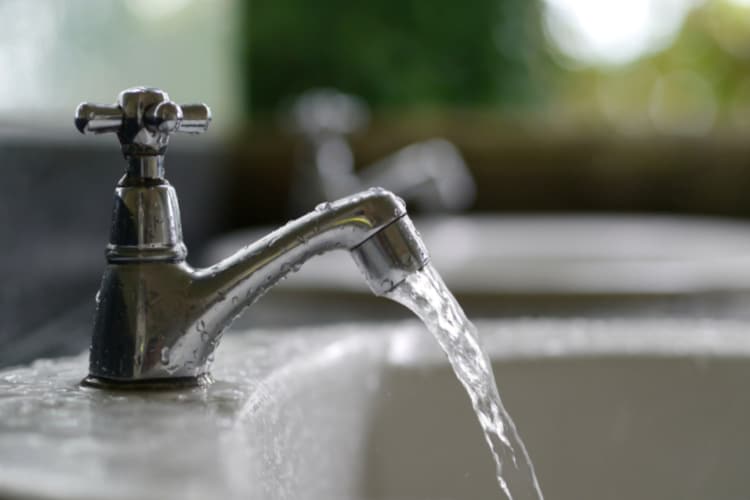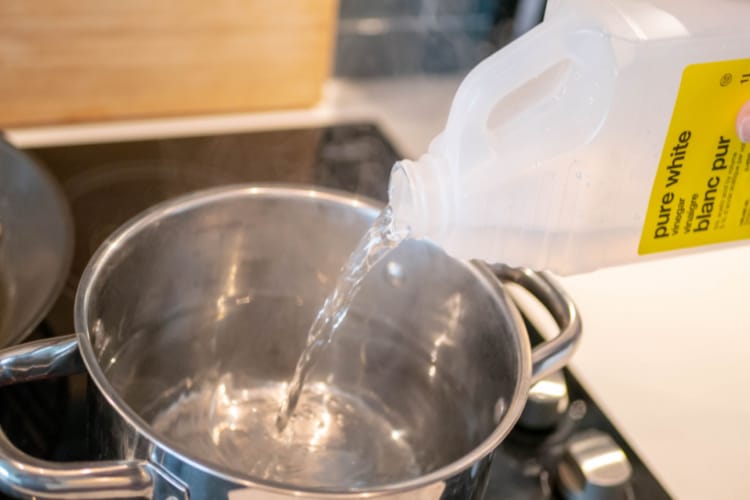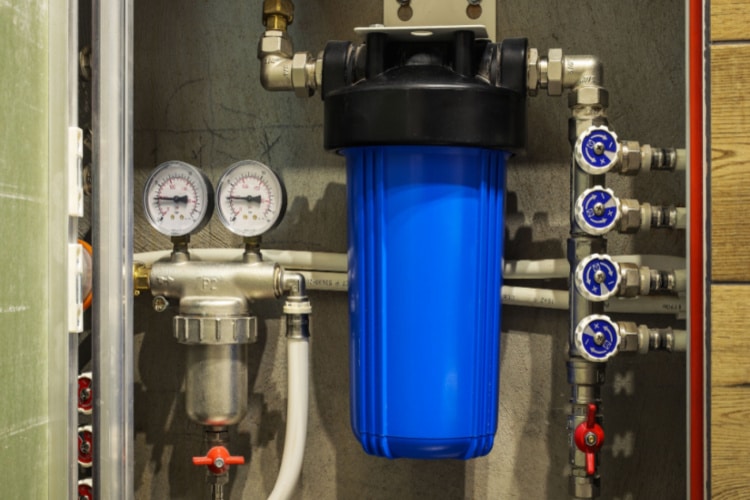Water smelling like rotten eggs is the last thing you expect in your home and something that’s always unsettling when it happens out of the blue. The common reason for the rotten eggs smell is the presence of hydrogen sulfide in the water supply.
The smell itself is unpleasant, and the taste isn’t any better. So the question is; what can you do to remove the sulfur smell?

Finding the Source of the Sulfur Smell
To find out the source, you first need to determine whether the smell occurs when running cold or hot water.
There are 2 ways to do this:
- a) run your cold and hot taps separately for a few minutes, and
- b) try each faucet, one at a time, to identify exactly where the smell is coming from.
If the sulfur smell occurs when running hot water, it could be due to a chemical reaction inside the water heater or a bacterial formation. When there is a degrading anode rod (a metal rod that runs along the centerline of water tanks) made of magnesium in the tank, it’s likely to cause such problems.
Sulfate bacteria, on the other hand, forms when water inside the tank stays stagnant for too long. They thrive well in environs with hot temperatures and little oxygen like the inside of a water heater.
If it happens when running cold water, there could be high levels of hydrogen sulfide gas and sulfur bacterium in the water. The sulfur smell from cold water could also indicate excessive hard water in your home. Hard water isn’t harmful by itself and it can easily be handled by a water softener.
However, if it occurs no matter the temperature of the water, the problem is probably in your water source. In this case, you may want to have your supply inspected by a professional or, if your supply is from a well, have it tested to see if it’s in accordance with CDC (Centers for Disease Control and Prevention) regulations.
Why Water Smells Like Sulfur In One Faucet?
If the smell is coming from just one faucet, there’s a good chance that the source is located in the drainage. Sometimes, all the waste that goes through the sink might build up somewhere in the drainage and lead to bacterial formation.
To confirm whether there is an issue with the drainage, open the tap and fill a glass. Then, step away from the faucet, swirl the glass a couple of times, and sniff it.
If the water doesn’t have any smell, then the drain is the culprit. Check for twisted pipes by visually inspecting them.
How to Fix Smelly Tap Water from One Faucet
The best way to deal with this issue is by cleaning the drain.
Here’s what you need:
- Hot water
- Vinegar

Mix equal quantities of hot water and vinegar. Pour the mixture into the smelly drain and leave it unused for several hours. Vinegar will fix the problem.
Ensure you repeat this cleaning process 3-4 times to ensure that all buildup within the drainage is cleared.
How to Fix Smelly Tap Water from All Faucets
If the sulfur smell comes from all faucets, you need to check your water sources. For a home well, you will have to flush it using a chlorine solution. Chlorine will help reduce the strength of the smell.
On the other hand, for municipality water, you will need activated carbon filters to help get rid of hydrogen sulfide. These filters will absorb all the chemicals, heavy metals, and other sorts of contaminants in the water before getting to your faucet.
Other possible solutions include:
- Flush water heater using hot water
- Use water softener
- Replace the anode rod
- Install a home filtration system

In situations where you have no control over your water source, there is no easy way out but to install home filtration systems. While this might be a costly option for most people, they can also use faucet-mounted filters.
Is it Safe to Use Smelly Water to Clean Dishes?
Water smelling like sulfur isn’t harmful, just unpleasant. You can still use this water for various human consumption such as washing the dishes or showering. However, it’s advisable to deal with it as soon as possible or avoid it until it’s completely taken care of.
The solutions we listed above might help you fix the smelly water coming out of your faucet.
Can Sulfur Smell Go Away on Its Own?
Unfortunately, the smell of sulfur won’t disappear until you use one of the solutions we’ve outlined in this article.
If the source of the odor is the tank, it’s time to drain all the water and clean the system. In addition, we absolutely recommend softeners and whole house filtration systems to prevent further occurrences.
Wrapping Up With the Best Course of Action…
There are three main reasons for the sulfur smell in one faucet; bacteria in the water heater, bacteria in the water supply, or bacteria in the drainage.
If it’s the lattermost, you’re likely to experience this particular odor when you’re near a particular faucet.
If that’s the case, you can easily fix it. Sending a mix of hot water and vinegar down that drain will eliminate any bacterial formation.
However, until you solve the problem, it’s safe to buy bottled water to cook and drink. It might not be harmful, but it’s better to be safe than sorry, right? So, take some time to remedy the situation.
When you say that the smell may be coming from the drain, do you mean when the water from the tap hits a certain place in the drain that it emits an odour or do you mean that the smell from the drain is somehow getting into the tapwater. We have an odour in our cold water in the kitchen tap That we smell after the water has been running for only a few seconds thank you .
Hi Shelley, it’s the first scenario that you mentioned. If it’s with cold tap water from only your kitchen faucet that you smell only after running your water for a few seconds, it seems likely that you have something in the drainage that is responsible for the smell. If no other faucets in your house have this problem and it’s also not just hot water that does this, it sounds like the scenario we described in the article you read.
The cold water taps in all three of our bathrooms have a strong sulphur odor when you turn on the tap . This doesn’t happen in the showers or kitchen taps. The odor dissipates if the taps run for about 30 seconds. We have had our well tested and it is fine. A few months ago we had the water treated (shocked) using bleach at the well head. This worked for a short time, but it took nearly two days to bleach and clear the lines. We’re not exactly sure what to do next to permanently get rid of the odor. Shocking the well every few months doesn’t seem like a good solution. The cause is clearly not our water heater. Any suggestions?
Hi Judy. Maybe there is some bacteria in the lines. I would recommend a full lab water test to see what is going on.
Well, thank you so much! It’s been over a year of trying to get the smell of sulfur to go away and it was in the drain! Keep up the great work!
I found the link you shared very informative. It’s great to know how to deal with the unpleasant sulfur smell that can sometimes come from our faucets. The step-by-step process the article provides to identify and fix the issue is very helpful. I also appreciate the suggestion to get professional help if needed. Water quality is crucial to our health, and it’s important to take it seriously. Thank you for sharing this resource!
I have been struggling with a sulpher smell in the cold water in one bathroom for several years. After running the water for a short time, the smell goes away. I don’t believe it is in the drain because I can smell it in a glass of water. I have been changing the under-the-sink supply line which corrects the problem for 3-4 months but the smell always returns. If the bacteria were growing in the main supply line, why does the smell go away when I change the under-the-sink supply line?
Hi Jim, are you on well or city water? Do you have any kind of water treatment system? The first and best advice is typically to start with a water test to make sure we have the facts about what is in your water to understand next steps.
My rotten egg smell is confined to one faucet in the bathroom. I cleaned it before by sucking in a solution of bleach and water. And that fixes it. I have a new Fossett and unbelievably, the smell came back. There is no smell in any other faucet or the drain. What is the concentration of bleach to use to kill the bacteria in the faucet? That is what mixture of hypo chloride, bleach, and water should I use?
Hi Jeffrey, the best method for diluting to prepare a bleach mixture is to read the bottle’s label as there can be differences in bleach products. If there aren’t any instructions, then there are recommendations of around 1:9-20 ratios to use. That is 1 part bleach for 9-20 parts of water, depending on the situation and how conservative to be.